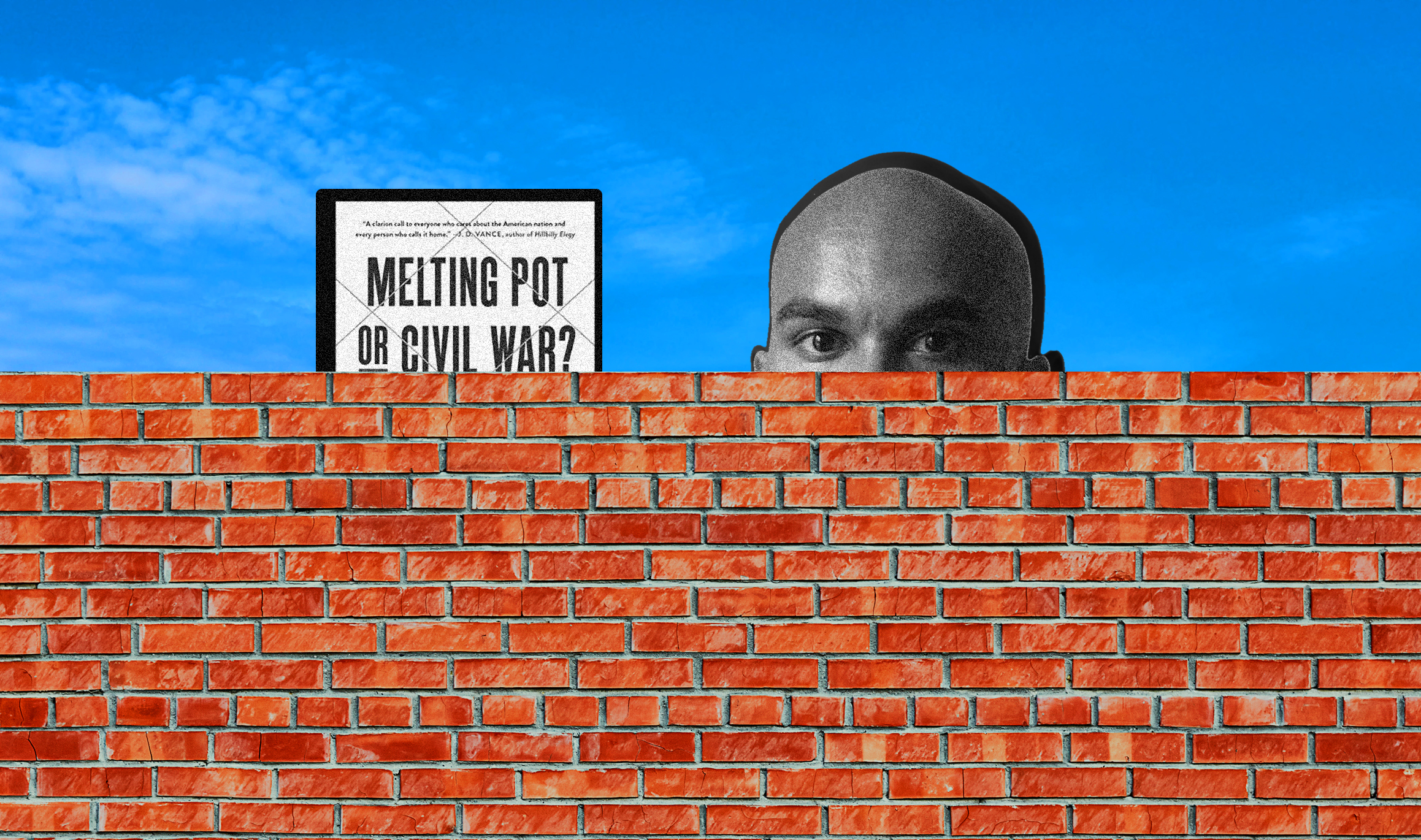The nuanced arguments of America's smartest immigration restrictionists
What does it mean to be an American — and who should get to be one?


A free daily email with the biggest news stories of the day – and the best features from TheWeek.com
You are now subscribed
Your newsletter sign-up was successful
What does it mean to be an American? Who should get that privilege, and what benefits should it entail?
Reihan Salam, executive editor of National Review, confronts these questions in his new and provocative book, Melting Pot or Civil War: A Son of Immigrants Makes the Case Against Open Borders. It's a must-read for anyone with an interest in immigration policy, as a book that combines significant policy expertise with a clear and cogent argument. Even if (like me) you are ultimately skeptical of Salam's approach, this book is well worth engaging.
As a conservative who favors a tighter immigration policy, Salam is superficially in sync with President Trump. But this book isn't Trumpian. Far from embracing a resentful ethno-nationalism, Salam seems motivated above all by a sincere concern that we haven't done enough to help disadvantaged Americans succeed. Slowing immigration is just one of his recommended steps towards the creation of a new "middle-class melting pot," in which all American children (including undocumented immigrants) can have a secure future.
The Week
Escape your echo chamber. Get the facts behind the news, plus analysis from multiple perspectives.

Sign up for The Week's Free Newsletters
From our morning news briefing to a weekly Good News Newsletter, get the best of The Week delivered directly to your inbox.
From our morning news briefing to a weekly Good News Newsletter, get the best of The Week delivered directly to your inbox.
A successful melting pot, as Salam sees it, is just like a good stew. It won't come out well unless we pay proper attention to the ingredients. As a second-generation Bengali American, Salam understands how high levels of immigration can actually hinder recently naturalized citizens in their efforts to join the cultural mainstream. When overall levels of immigration are low, the immigrants we do have will be highly motivated to adapt and assimilate. First-generation immigrants may have varied levels of success here, but their children will integrate more fully, quite possibly without much resistance from the surrounding culture. Small numbers of newcomers are likely to be perceived as an interesting curiosity more than a threat, so most people won't object to befriending, employing, or even marrying them.
As immigration levels rise, however, the story changes. Large-scale migration has a far more significant impact on the economy and surrounding culture. Not everyone will welcome the changes. As tensions rise, newcomers may find it more comfortable to stick to neighborhoods dominated by co-ethnics, who speak familiar languages and retain familiar customs. Unsurprisingly, the range of available opportunities within these subcultures tends to be small, and residents are normally poorer than the population at large. That might seem acceptable to first-generation immigrants, who still feel on balance that they have bettered their lives by immigrating. The next generation will be less sanguine though, and their frustration, juxtaposed against the rising resentment of the surrounding population, is a recipe for ethnic conflict.
To the cosmopolitan mind, this logic is thoroughly depressing. Is it fruitless even to try to encourage an ethos of tolerance? Is nativism simply imprinted onto the human soul?
Salam argues that people can be persuaded to tolerate differences, provided we don't ask too much from them. In concert with most elite leftists, he wants to move toward a culture that's highly educated, technologically advanced, and cosmopolitan in its embrace of a multi-ethnic population. But he thinks this will be achievable only if we manage immigration carefully, limiting our welcome to immigrants who seem well suited to rapid assimilation. In practice, that means saying "yes" to the educated and affluent, and "no" to the huddled masses.
A free daily email with the biggest news stories of the day – and the best features from TheWeek.com
I have argued before that citizenship has in our time become a kind of global caste system. In that context, Salam might be seen as a modern-day Lord Salisbury, prioritizing social stability and accepting that this can be preserved only in an exclusive society. It's a strong argument, as even his detractors should acknowledge. If we want to secure certain goods for all American citizens (including decent health care, a quality education, and real inclusion in mainstream society), we'll necessarily have to be choosy about who's admitted to the club. Our resources aren't infinite, and there's a limit to how much diversity we can absorb while still maintaining a cohesive society.
Of course, caste systems have obvious moral shortcomings. Recognizing that, Salam includes a complete chapter on foreign aid, which he would like to increase as a kind of compensation for his less-generous immigration policy. This segment of the book is illuminating in many ways, and Salam has some interesting ideas. But he is noticeably loathe to acknowledge the limitations of foreign aid. Good intentions notwithstanding, America's capacity to improve life across the globe is quite limited. That will become even more true if the Pax Americana continues to erode (which is not something Salam has in general been inclined to lament).
Two or three decades ago, things might have seemed different. At that time many people really believed that the planet could be moving toward an era of widespread peace, prosperity, and freedom. Today, that's not looking like a strong bet. A sizable percentage of the world's population lives under politically oppressive regimes, and that number seems if anything to be growing. If Western nations are unwilling to resettle refugees and migrants, the reality is that many will end up stuck in places where life is generally bad. Salam would prefer to see these unfortunates settled someplace else, so that we can focus our energies here on helping second- and third-generation immigrants, impoverished urban blacks, and the underemployed denizens of the Rust Belt. But of course, other developed nations are likewise struggling to persuade their citizens to be open to immigrants. Why should other societies be more generous, if we ourselves are willing to do almost nothing in this regard?
No matter what policy we adopt, Salam's concerns about integration are surely worth considering. No one will benefit if we adopt a naively ideological immigration policy, without regard for the consequences. At the same time, his position is itself based in ideological commitments that some of us may question. In Salam's mind, the quintessentially American society seems to be a kind of managed middle-class culture, in which carefully crafted government interventions help to keep class stratification in check. To me, that sounds more like a Scandinavian ideal, and I'm not sure how close we can get to it anyway. The United States is already a huge and wildly diverse nation, riven by deep religious and philosophical differences along with the ethnic and cultural ones. Technological advancement seems if anything to increase inequality further, none of which has much to do with immigration. We should still care about helping marginalized groups to flourish, insofar as we are able. But it might also be good to accept that Americans just don't specialize in creating high-solidarity monocultures. Historically we've been better at negotiating a strained-but-usually-livable peace between more widely divergent groups, who are united at least in their commitment to building a life outside of the shadow of political oppression. Is this really the right moment to walk away from those commitments?
As the world becomes more and more interconnected, nationalists will increasingly struggle to justify the priority they want to place on citizenship as a moral category. This obviously represents a major shift in human perspective, which is worrisome; transformations of that magnitude have real potential to create instability. That is in itself an excellent reason to give due credit to nuanced anti-immigration arguments, such as Salam presents in this book. Over the longer run though, is an "America first" immigration policy sustainable? Will our children thank us for doubling down on a robustly egalitarian vision, which may just not fit the contours of our freedom-loving society? I'm inclined to doubt it. But read the book before you answer.
Rachel Lu is a writer based in Roseville, Minnesota. Her work has appeared in many publications, including National Review, The American Conservative, America Magazine, and The Federalist. She previously worked as an academic philosopher, and is a Robert Novak Journalism Fellow.
